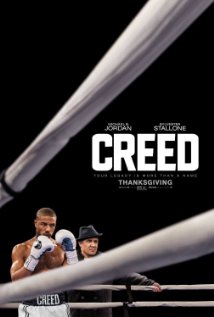Country: USA
Movie Review: “Creed” takes the ‘Italian Stallion’, Rocky Balboa (Sylvester Stallone), one more time into the boxing ring, this time not to defend his heavyweight champion title but to train the fearless, self-taught Adonis Johnson (Michael B. Jordan), the son of Apollo Creed, Rocky’s former tough opponent and later turned into a cherished friend. The film, sturdily directed by Ryan Coogler, who already had worked with Mr. Jordan in the excellent “Fruitvale Station”, begins with a very young Adonis putting up a fight with another kid in the L.A. youth facility where he spends his unhappy days. Adonis was born from an extramarital relationship and never had the chance to know his father, who died before he could see the daylight. Placed in isolation to calm down, Adonis, receives the visit of Mary Anne (Phylicia Rashad), his father’s wife who compassionately takes him to live with her. Seventeen years later, Adonis is well established in life, working in a respected financial company that provides him all the comfort he needs. However, he boils inside with an unstoppable energy, frequently mingled with anger, which has to be canalized somewhere. Unsurprisingly, he quits his job to become a professional boxer, even if that implies to cut ties with his adoptive mother who gets tremendously disappointed. But ambition and nerve are not everything, and the inexperienced Adonis acknowledges the need of additional training, the reason why he moves to Philadelphia and tries to persuade the old Rocky to teach him everything he needs to grab the title. He also catches sight of a noisy neighbor, Bianca (Tessa Thompson), a nightclub performer who becomes a supportive girlfriend. Along the way, both trainer and trainee have different battles to fight, but happily for them, the emblematic streets of Philadelphia are divided in two complementary ways, in which giving and receiving are shared in equal proportions. The word family acquires a very strong signification, increased with the last-minute encouragement from Mary Anne, who insists that Adonis’ legacy should be accepted once and for all. “Creed” cannot hide its crowd-pleasing nature, but shows a very entertaining side both in sports and drama. Even applying a few sentimental baits and picking up a couple maneuvers from the previous formulas, the film was still able to put a fierce energy and exciting agitation in the scenes, leading us to the probably most straightforward final combat from all the Rocky installments. In addition, the humor was very effective, and speaking of legacies, this is just the beginning of a new cycle named Creed, and it's heartbreaking knowing that Stallone’s Rocky may not survive the next sequel.

























